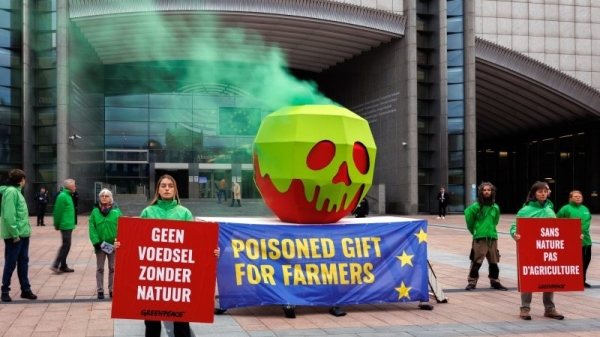NGOs warn of ‘poisoned gift’ for farmers as Parliament votes to fast-track easing of green rules

As the European Parliament is paving the way for a swift approval of the relaxation of some environmental requirements in the Common Agricultural Policy (CAP) for the 2023-2027 period, NGOs are mobilising against the decision.
The Parliament approved on Thursday (11 April) the use of an “urgent procedure” to fast-track the adoption of the European Commission’s simplification package for certain green CAP rules, aimed at easing their burden on farmers.
In a bid to appease the recent wave of protests across the bloc, on 15 March, the EU executive proposed two regulations laying down changes to six of the nine Good Agricultural and Environmental Conditions (GAECs) standards on which CAP payments hinge upon, and giving member states more flexibility to implement the policy.
The package was composed by a delegated regulation on GAEC 1 on permanent grassland, and another legislative act.
More than one hundred MEPs (104) from several political parties (Socialists and Democrats, Greens, the Left, Renew) have taken action to hamper the rapid adoption of changes to GAEC 1, forcing a vote on it during the next plenary, on 22-25 April.
But MEPs agreed on Thursday to speed up the process on the rest of the package, (432 votes in favour, 155 against and 13 abstentions), heading to a vote to approve the new rules in the same session.
It will then be up to the Council to formally adopt the measures, which could come into force by June 2024.
NGOs mobilise
Environmental NGOs and consumer organisations have slammed the measures presented by the EU executive, saying they miss the point.
“Stripping away the last environmental protections is a poisoned gift for farmers,” Greenpeace’s EU agriculture director Marco Contiero said after a protest outside the Parliament on Thursday, adding that the changes will make farmers more vulnerable to climate change “while doing nothing to address their precarious economic situation”.
Several organisations have accused the EU institutions of disregarding democratic principles in rushing to approve the package.
“Neither the necessary impact assessment, nor an adequate, time-sufficient consultation (…) have been carried out,” said a letter sent on Wednesday by European peasant organisation Via Campesina and the organic farming association IFOAM to European Commission President Ursula von der Leyen.
After the vote, Marilda Dhaskali, BirdLife’s EU agriculture officer, accused EU parties of “undermining democratically agreed legislation” to secure support ahead of the EU elections.
Permanent grassland controversy
In the first move to tackle farmers’ concerns, the Commission proposed on 12 March relaxing rules on GAEC 1, which now makes it mandatory to keep areas of permanent grassland stable.
After the European Parliament’s agriculture committee (AGRI) opted for an “early objection” procedure, the change was to be approved without a debate and vote in Parliament.
But French MEP Christophe Clergeau, responsible for agriculture and environment in the Socialists and Democrats group, managed to get the required signatures to force a vote on 22-25 April.
“I refuse to see the abandonment of the greening of the CAP happen in political secrecy,” he said in a press release, adding that environmental requirements were the result of three years of negotiations on the last CAP and should not be scrapped “in just a few days”.
[Edited by Angelo Di Mambro and Zoran Radosavljevic]
Read more with Euractiv




